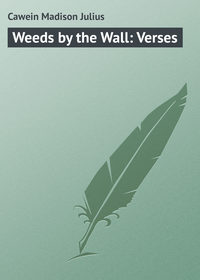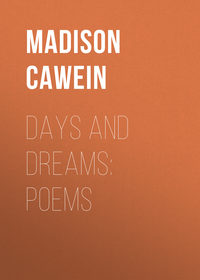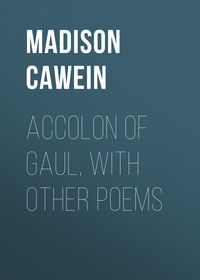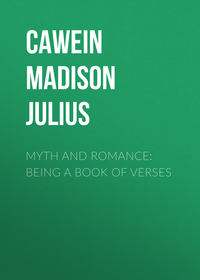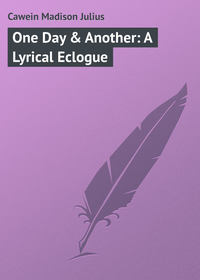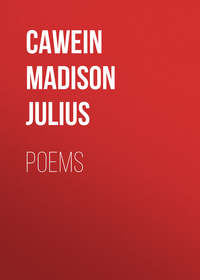The Poems of Madison Cawein. Volume 2 (of 5)
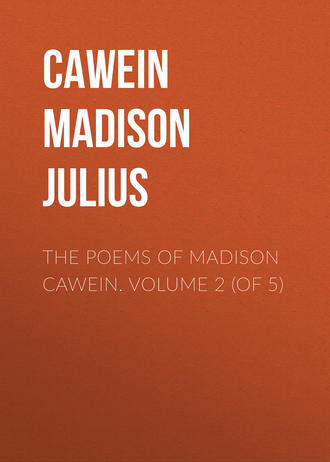 полная версия
полная версияThe Poems of Madison Cawein. Volume 2 (of 5)
Жанр: зарубежная поэзиязарубежная классиказарубежная старинная литературастихи и поэзиясерьезное чтениеcтихи, поэзия
Язык: Английский
Год издания: 2018
Добавлена:
Настройки чтения
Размер шрифта
Высота строк
Поля
EPILOGUE
Would I could sing of joy I onlyRemember as without alloy:Of life full-filled, that once was lonely:Of love a treasure, not a toy:Of grief, regret but makes the keener,Of aspiration, failure mars—These would I sing, and sit serener.Than song among the stars.Would I could sing of faith unbroken;Of heart-kept vows, and not of tears:Of promised faith and vows love-spoken,That have been kept through many years:Of truth, the false but leaves the truer;Of trust, the doubt makes doubly sure—These would I sing, the noble doerWhose dauntless heart is pure.I would not sing of time made hateful;Of hope that only clings to hate:Of charity, that grows ungrateful;And pride that will not stand and wait.—Of humbleness, care hath imparted;Of resignation, born of ills,These would I sing, and stand high-heartedAs hope upon the hills.Once on a throne of gold and scarletI touched a harp and felt it break;I dreamed I was a king—a varlet,A slave, who only slept to wake!—Still on that harp my memory lingers,While on a tomb I lean and read,“Dust are our songs, and dust we singers,And dust are all who heed.”POEMS OF LOVE
What though I dreamed of mountain heights,Of peaks, the barriers of the world,Around whose tops the Northern LightsAnd tempests are unfurled!Mine are the footpaths leading throughLife’s lowly fields and woods,—with rifts,Above, of heaven’s Eden blue,—By which the violet liftsIts shy appeal; and, holding upIts chaliced gold, like some wild wine,Along the hillside, cup on cup,Blooms bright the celandine.Where soft upon each flowering stockThe butterfly spreads damask wings;And under grassy loam and rockThe cottage cricket sings.Where overhead eve blooms with fire,In which the new moon bends her bow,And, arrow-like, one white star by herBurns through the afterglow.I care not, so the sesameI find; the magic flower there,Whose touch unseals each mysteryIn water, earth, and air.That in the oak tree lets me hearIts heart’s deep speech, its soul’s dim words;And to my mind makes crystal clearThe messages of birds.Why should I care, who live aloofBeyond the din of life and dust,While dreams still share my humble roof,And love makes sweet my crust.GERTRUDE
When first I gazed on Gertrude’s face,Beheld her loveliness and grace;Her brave gray eyes, her raven hair,Her ways, more winsome than the spring’s;Her smile, like some sweet flower, that flingsIts fragrance on the summer air;And when, like some wild-bird that sings,I heard her voice,—I did declare,—And still declare!—there is no one,No girl beneath the moon or sun,So beautiful to look upon!And to my heart, as I know well,Nothing seems more desirable,—Not Ophir gold, nor Orient pearls—Than seems this jewel-girl of girls.LOVE
For him, who loves, each mounting mornBreathes melody more sweet than birds’;And every wind-stirred flower and thornWhispers melodious words:—Would you believe that everythingThrough her loved voice is made to sing?For her, the faultless skies of dayGrow nearer in eternal blue,Where God is felt as wind and ray,And seen as fire and dew:—Would you believe that all the skiesAre Heaven only through his eyes?For them, the dreams that haunt the nightWith mystic beauty and romance,Are presences of starry light,And moony radiance:—Would you believe this love of theirsCould make for them a universe?HEART OF MY HEART
I
Here where the season turns the land to gold,Among the fields our feet have known of old,—When we were children who would laugh and run,Glad little playmates of the wind and sun,—Before came toil and care and years went ill,And one forgot and one remembered still;Heart of my heart, among the old fields here,Give me your hands and let me draw you near,Heart of my heart.II
Stars are not truer than your soul is true;What need I more of heaven then than you?Flowers are not sweeter than your face is sweet—What need I more to make my world complete?O woman nature, love that still endures,What strength hath ours that is not born of yours?Heart of my heart, to you, whatever come,To you the lead, whose love hath led me home.Heart of my heart.STROLLERS
I
We have no castles,We have no vassals,We have no riches, no gems and no gold:Nothing to ponder;Nothing to squander—Let us go wanderAs minstrels of old.II
You with your lute, love;I with my flute, love,Let us make music by mountain and sea:You with your glances,I with my dances,Singing romancesOf old chivalry.III
“Derry down derry!Good folk, be merry!Hither! and hearken where happiness is!Never go borrowCare of to-morrow,Never go sorrowWhile life hath a kiss!”IV
Let the day gladden,Or the night sadden,We will be merry in sunshine or snow:You with your rhyme, love,I with my chime, love,We will make Time, love,Dance as we go.V
Nothing is ours;Only the flowers,Meadows, and stars, and the heavens above:Nothing to lie for,Nothing to sigh for,Nothing to die forWhile still we have love.VI
“Derry down derry!Good folk, be merry!Hither! and hearken a word that is sooth:—Care ye not any,If ye have many,Or not a penny,If still ye have youth!”THE BURDEN OF DESIRE
I
In some dim way I know thereof:A garden glows down in my heart,Wherein I meet and often partWith many an ancient tale of love.A Romeo garden, banked with bloom,And trellised with the eglantine;In which a rose climbs to a room,A balcony one mass of vine,Dim, haunted of perfume.A balcony, whereon she gleams,The soft Desire of all Dreams,And smiles and bends like Juliet,Year after year,While to her side, all dewy wet,A rose stuck in his ear,Love climbs to draw her near.II
And in another way I know,Down in my soul a graveyard lies,Wherein I meet, in ghostly wise,With many an ancient tale of woe.A graveyard of the Capulets,Deep-vaulted with ancestral gloom,Through whose dark yews the moonlight jetsOn many a wildly carven tomb,That mossy mildew frets.A graveyard where the Soul’s DesireSleeps, pale-entombed; and, kneeling by her,Love, like that hapless Montague,Year after year,Weary and worn and wild of hue,Within her sepulchre,Falls bleeding on her bier.THE TRYST
At dusk there fell a shower:The leaves were dripping yet:Each fern and rain-weighed flowerAround was gleaming wet,When, through the evening glower,His feet towards her were set.The dust’s damp odor siftedAround him, cool with rain,Mixed with the musk that driftedFrom woodland and from plain,Where white her garden liftedIts pickets down the lane.And there she stood! ’mid scatteredClove-pink and pea and whorlOf honeysuckle,—flatteredTo sweetness wild,—a girl,O’er whom the clouds hung shatteredIn moonlit peaks of pearl.She made the night completerFor him; and earth and air,In that small spot, far sweeterThan heaven or anywhere.—Swift were his lips to greet her,Her lips love lifted there.GYPSYING
Your heart ’s a-tune with April and mine a-tune with June,So let us go a-roving beneath the summer moon.Oh, was it in the sunlight, or was it in the rain,We met among the blossoms within the locust lane?All that I can remember ’s the bird that sang aboon,And with its music in our hearts we ’ll rove beneath the moon.A love-word of the wind, dear, of which we ’ll read the rune,While we two go a-roving beneath the summer moon.A love-word of the water we ’ll often stop to hear—The echoed words and whispers of our own hearts, my dear.And all our paths shall blossom with wild-rose sweets that swoon,And with their fragrance in our hearts we ’ll rove beneath the moon.It will not be forever; yet merry goes the tuneWhile we two still are rovers beneath the summer moon.A cabin, in the clearing, of flickering firelight,When old-time lanes we strolled in the winter snows make white:Where we can dream together above the logs and croonThe songs we sang when roving beneath the summer moon.UNCERTAINTY
“‘He cometh not,’ she said.”—Mariana
It will not be to-day and yetI think and dream it will; and letThe slow uncertainty deviseSo many sweet excuses, metWith the old doubt in hope’s disguise.The panes were sweated with the dawn;Yet through their dimness, shriveled drawn,The aigret of one princess-feather,One monk’s-hood tuft with oilets wan,I glimpsed, dead in the slaying weather.This morning when my window’s chintzI drew, how gray the day was!—SinceI saw him, yea, all days are gray!—I gazed out on my dripping quince,Defruited, torn; then turned awayTo weep, but did not weep: but feltA colder anguish than did meltAbout the tearful-visaged Year!—Then flung the lattice wide and smeltThe autumn sorrow. Rotting nearThe rain-drenched sunflowers bent and bleached,Up which the frost-nipped gourd-vines reachedAnd morning-glories, seeded o’erWith ashen aiglets; whence beseechedOne last bloom, frozen to the core.The podded hollyhocks—that FallHad stripped of finery—by the wallRustled their tatters; dripped and dripped,The fog thick on them: near them, allThe tarnished, hag-like zinnias tipped.I felt the death and loved it: yea,To have it nearer, sought the gray,Chill, fading garth. Yet could not weep,But wandered in an aimless way,And yearned with weariness to sleep.Mine were the fog, the frosty stalks,The weak lights on the leafy walks,The shadows shivering with the cold;The breaking heart; the lonely talks;The last, dim, ruined marigold.But when, to-night, the moon swings low—A great marsh-marigold of glow—And all my garden with the seaMoans, then, through moon and mist, I knowHis ghost will come to comfort me.LOST LOVE
I loved her madly. For—so wroughtYoung Love, divining Isles of TruthLarge in the central seas of Youth—“Love will win love,” I thought.Once when I brought a rare wild pinkTo place among her plants, the wise,Soft lifting of her speaking eyesSaid more than thanks, I think....She loved another.—Yes, I knowAll you would say of woman. You,Like other men, would comfort too....But then I loved her so.She loved another.—Ah! too wellI know the story of her soul!—A weary tale the weary wholeOf how she loved and fell.I loved her so!… Remembering nowMy mad grief then, I wonder whyGrief never kills.... I could not die.—She died—I know not how.Strange, is it not? For she was dearTo me as life once.—A regretShe is now; just to make eyes wetAnd bring a fullness here.Yet, had she lived as dead in shameAs now in death, Love would have usedPride’s pitying pencil and abusedThe memory of her name.This helps me thank my God, who ledMy broken life in sunlight ofThis pure affection, that my loveLives through her being dead.OVERSEAS
Non numero horas nisi serenasWhen fall drowns morns in mist, it seemsIn soul I am a part of it;A portion of its humid beams,A form of fog, I seem to flitFrom dreams to dreams.An old chateau sleeps ’mid the hillsOf France: an avenue of sorbsConceals it: drifts of daffodilsBloom by a ’scutcheoned gate with barbsLike iron bills.I pass the gate unquestioned, yet,I feel, announced. Broad holm-oaks makeDark pools of restless violet.Between high bramble banks a lake,—As in a net.The tangled scales twist silver,—shines …Gray, mossy turrets swell aboveA sea of leaves. And where the pinesShade ivied walls, there lies my love,My heart divines.I know her window, dimly seenFrom distant lanes with hawthorn hedged:Her garden, with the nectarineEspaliered, and the peach-tree, wedged’Twixt walls of green.Cool-babbling a fountain fallsFrom gryphons’ mouths in porphyry;Carp haunt its waters; and white ballsOf lilies dip it that the beeSucks in and drawls.And butterflies, each with a faceOf faëry on its wings, that seemBeheaded pansies, softly chaseEach other down the gloom and gleamTrees interspace.And roses! roses, soft as vair,Round sylvan statues and the oldStone dial—Pompadours that wearTheir royalty of purple and goldWith queenly air....Her scarf, her lute, whose ribbons breatheThe perfume of her touch; her gloves,Modeling the daintiness they sheathe;Her fan, a Watteau, gay with loves,Lie there beneathA bank of eglantines that heapsA rose-strewn shadow.—Naïve-eyed,With lips as suave as they, she sleeps;The romance by her, open wide,O’er which she weeps.AT THE STILE
Young Harry leapt over the stile and kissed her,Over the stile when the sun was sinking;’T was only Carrie; just Mary’s sister!—And love hath a way of thinking.“Thy pail, sweetheart, I will take and carry.”Over the stile one star hung yellow.—“Just to the spring, my dearest Harry.”—And Love is a heartless fellow.“Thou saidst me ‘yea’ in an April showerUnder this tree with leaves a-quiver.”—“I say thee nay now the cherry ’s in flower,And love is taker and giver.”“O false! thou art false to me, sweetheart!”—The light in her eyes grew trist and trister:“To thee, the stars, and myself, sweetheart,I never was aught but Mary’s sister.“Sweet Mary’s sister! just little Carrie!—But what avail my words or weeping?—Next month, perhaps, you two will marry—And I in my grave be sleeping.”Alone she stands ’mid the meadow millet,Wan as the petals the wind is strewing:Some tears in her pail as she stoops to fill it—And love hath a way of doing.FERN-SEED
“We have the receipt of fern-seed; we walk invisible.”—Henry IV
And you and I have met but thrice!—Three times enough to make me love!—I praised your hair once; then your glove;Your eyes; your gown—you were like ice.And yet this might suffice, my love,And yet this might suffice.I know now what it is I’ll do:I’ll search and find the ferns that grow,The fern-seed that the fairies know,And sprinkle fern-seed in my shoe,And haunt the steps of you, my dear,And haunt the steps of you.You ’ll see the poppy-pods dip here,The blow-ball of the thistle slip,And no wind breathing—but my lipNext to your anxious cheek and ear,To tell you I am near, my love,To tell you I am near.On wood-ways I will tread your gown—You ’ll know it is no brier!—thenI’ll whisper words of love again,And smile to see your quick face frown;And then I ’ll kiss it down, my dear,And then I ’ll kiss it down.You ’ll sit at home and read or knit,When suddenly the page is blotted—My hands!—or all your needles knotted:And in your rage you ’ll cry a bit:But I—I ’ll laugh at it, my love,But I—I ’ll laugh at it.The secrets which you say at prayerI too will hear; or, when you sing,I too will sing, and whisperingBend down and kiss your eyes and hair,And you will know me there, my dear,And you will know me there.Would it were true what people say!—Would I could find that faëry seed!Then would I win your love, indeed,By being near you night and day:—There is no other way, my love,There is no other way.

